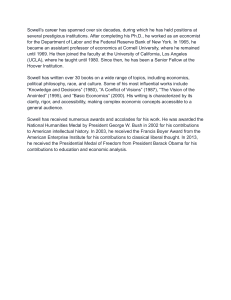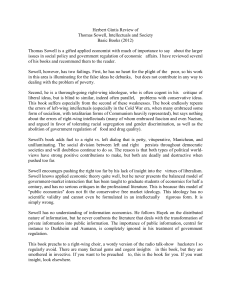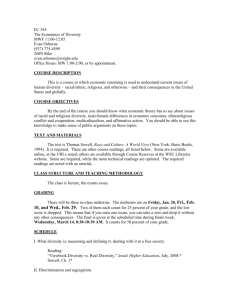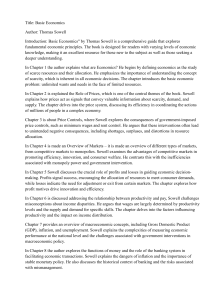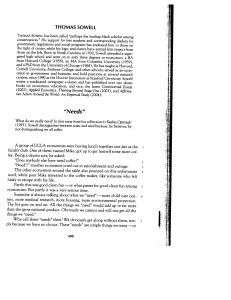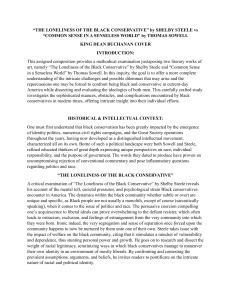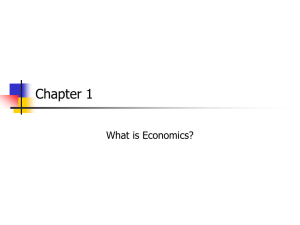Review of Thomas Sowell, Basic Economics
advertisement
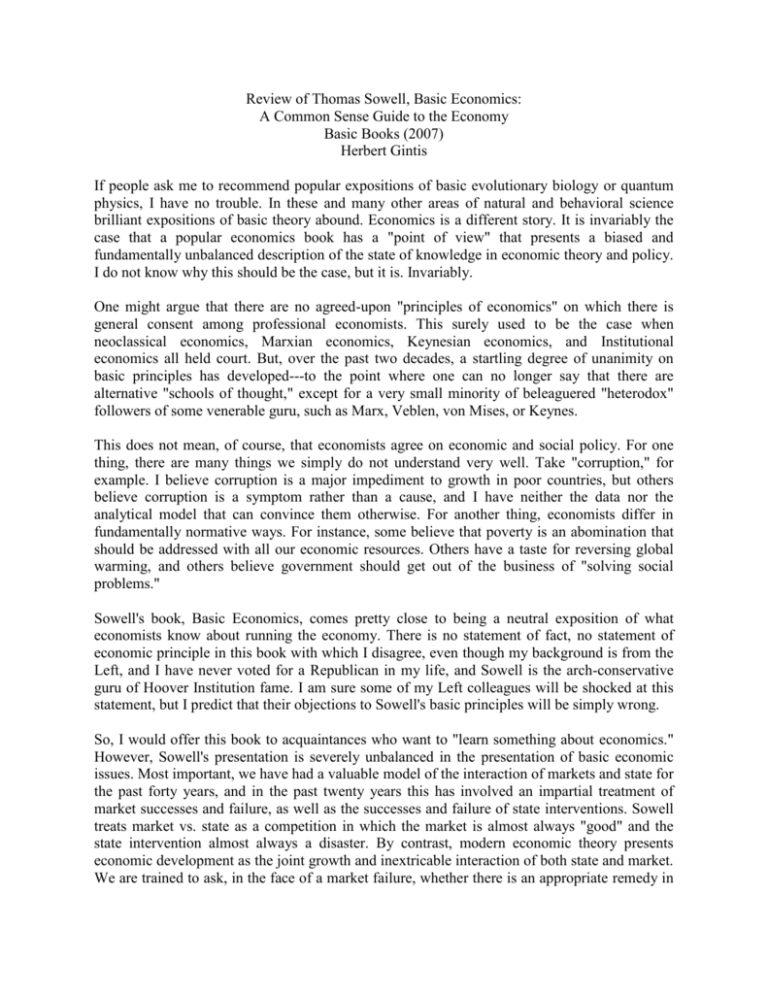
Review of Thomas Sowell, Basic Economics: A Common Sense Guide to the Economy Basic Books (2007) Herbert Gintis If people ask me to recommend popular expositions of basic evolutionary biology or quantum physics, I have no trouble. In these and many other areas of natural and behavioral science brilliant expositions of basic theory abound. Economics is a different story. It is invariably the case that a popular economics book has a "point of view" that presents a biased and fundamentally unbalanced description of the state of knowledge in economic theory and policy. I do not know why this should be the case, but it is. Invariably. One might argue that there are no agreed-upon "principles of economics" on which there is general consent among professional economists. This surely used to be the case when neoclassical economics, Marxian economics, Keynesian economics, and Institutional economics all held court. But, over the past two decades, a startling degree of unanimity on basic principles has developed---to the point where one can no longer say that there are alternative "schools of thought," except for a very small minority of beleaguered "heterodox" followers of some venerable guru, such as Marx, Veblen, von Mises, or Keynes. This does not mean, of course, that economists agree on economic and social policy. For one thing, there are many things we simply do not understand very well. Take "corruption," for example. I believe corruption is a major impediment to growth in poor countries, but others believe corruption is a symptom rather than a cause, and I have neither the data nor the analytical model that can convince them otherwise. For another thing, economists differ in fundamentally normative ways. For instance, some believe that poverty is an abomination that should be addressed with all our economic resources. Others have a taste for reversing global warming, and others believe government should get out of the business of "solving social problems." Sowell's book, Basic Economics, comes pretty close to being a neutral exposition of what economists know about running the economy. There is no statement of fact, no statement of economic principle in this book with which I disagree, even though my background is from the Left, and I have never voted for a Republican in my life, and Sowell is the arch-conservative guru of Hoover Institution fame. I am sure some of my Left colleagues will be shocked at this statement, but I predict that their objections to Sowell's basic principles will be simply wrong. So, I would offer this book to acquaintances who want to "learn something about economics." However, Sowell's presentation is severely unbalanced in the presentation of basic economic issues. Most important, we have had a valuable model of the interaction of markets and state for the past forty years, and in the past twenty years this has involved an impartial treatment of market successes and failure, as well as the successes and failure of state interventions. Sowell treats market vs. state as a competition in which the market is almost always "good" and the state intervention almost always a disaster. By contrast, modern economic theory presents economic development as the joint growth and inextricable interaction of both state and market. We are trained to ask, in the face of a market failure, whether there is an appropriate remedy in the form of state intervention, but we are not predisposed to a negative answer. Indeed, the modern economy is precisely a synergistic interaction of state and market, with rather small deviations from a common model in all advanced countries. As a general statement, I would say that markets do well in dealing with highly decentralized informational systems, whereas states do well in making the rules of game followed by participants in market exchange. As soon as state attempt to produce goods and services, or predict winners and losers, they are out of their domain of comparative advantage, and do poorly. On the other hand, there is nothing in fact, or in economic theory, that supports the notion that market exchange can generate efficient and welfare-enhancing rules of the game. Another example of Sowell's bias is his treatment of poverty and inequality. Sowell says very clearly that it is not right to take from those who have earned their income and wealth to give to those who have little. This right-wing principle seems to me to be grotesque and bizarre. Humans have been redistributing material wealth since the time of our hunter-gatherer forbears. If a crumb is redistributed from a man with a surfeit of fine food to a starving child, this appears to be to be a just and fair act. Of course, taking from a hard-working family to support an antisocial drug addict might well be unfair, but this is a different story. The basic unfairness of the capitalist economy is that people are born into a particular economic station, and that station will severely affect their ability to realize their ambitions and exercise their human capacities for self-realization. There is no way to avoid this situation, but Sowell does not even mention this issue is this volume. Pity. Contemporary American liberals will not like this book because it defends free international trade and criticizes many of the types of programs liberals favor. However, I think Sowell is usually correct. On the other hand, there have been monstrously successful liberal program that Sowell does not acknowledge, such as social security, Medicare, EITC, and the welfare system. We need similar programs to deal with world poverty, domestic poverty, environmental destruction, and several other important social issues. The correct way to deal with this problems is to use the market system, but to erect incentives that lead private individuals and firms to act on behalf of the public interest. Only a strongly synergistic pattern of market and state activity can conceivably succeed. Sowell's imbalance in favor of markets is, in this respect, part of the problem rather than part of the cure.
